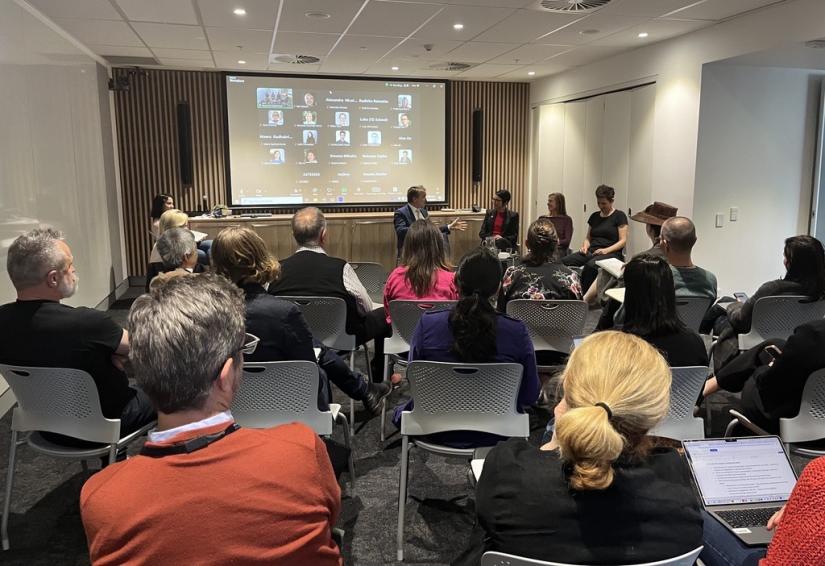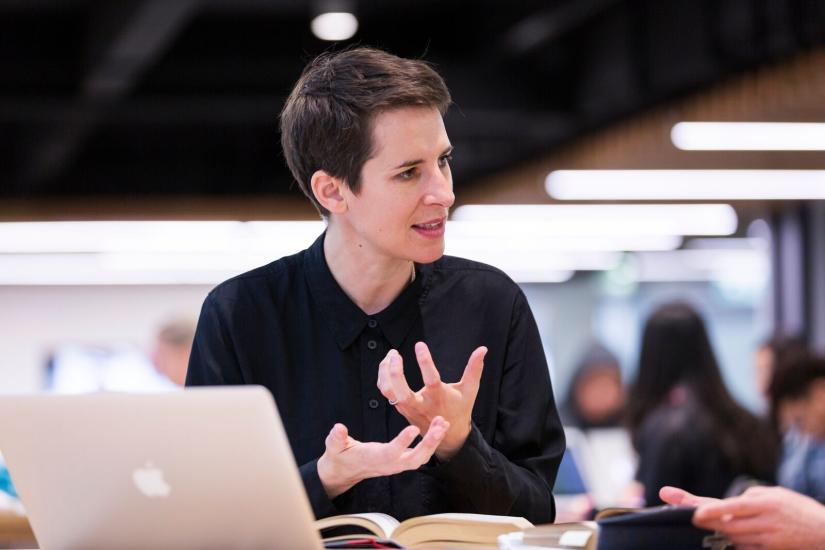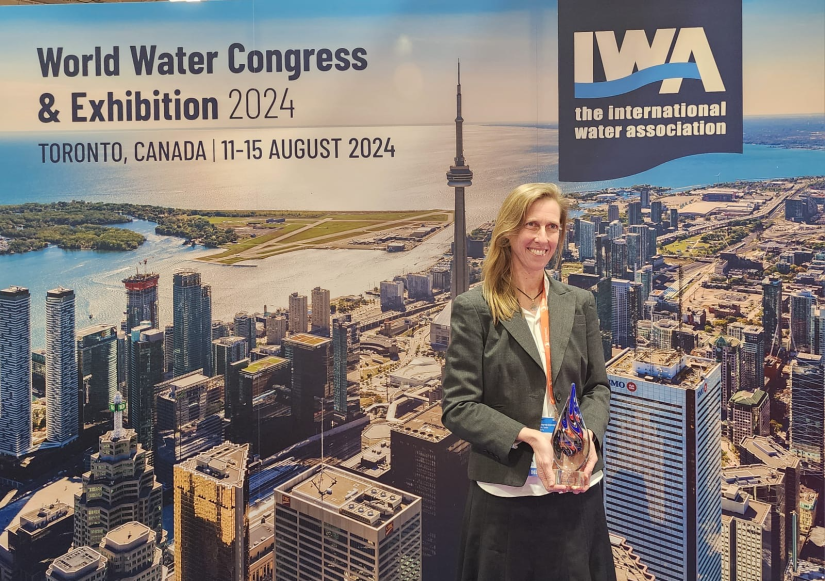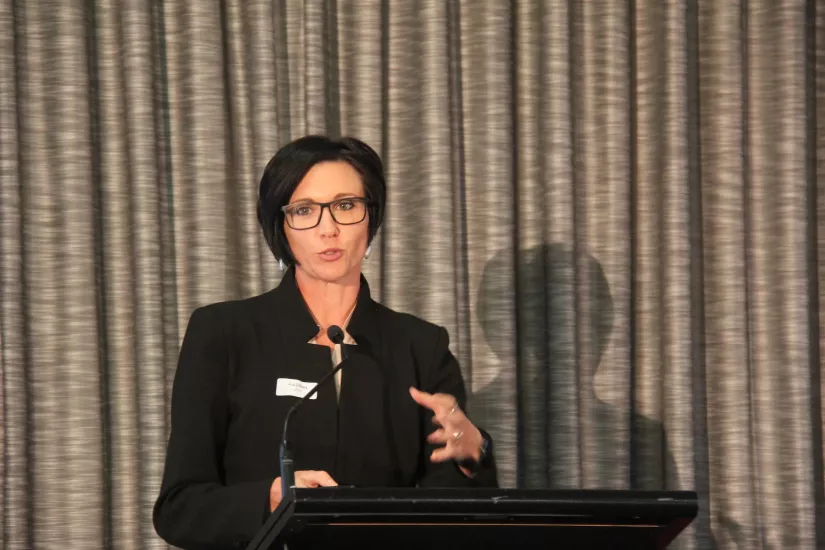Are you a researcher looking to improve your research impact? Discover how to engage with academia, community, industry and government.
Engaging with impact

UTS Research Leadership panel discussion: (from left to right) PVC Research Professor Chris Turney, Professor Jua Cilliers, Professor Juliet Willetts and Associate Professor Tamson Pietsch
At the final seminar in the Research Leadership panel series, Pro Vice-Chancellor (Research) Professor Chris Turney was joined by Professor Jua Cilliers, Professor Juliet Willetts and Associate Professor Tamson Pietsch who all have successfully bridged the gap between academia, the wider community, industry and government. The panellists shared their insights and experiences on forging meaningful collaborations, influencing policy and driving innovation that has impact on a global scale.
Why do we engage?
Jua is the Head of School of Built Environment and a Professor in Urban Planning where she heads up the UTS Green Infrastructure Lab. Her work focuses on cities, greening and changing the future of the urban environment.
“Why do we engage? It’s that real world impact but it’s also the reinforcement that what you are working on is a good idea and you get energy to do more,” she said.
Chris identified the common misconception of researchers that research outputs and industry engagement are binary, and researchers must choose one or the other. However, Jua explained the positive benefits of engagement to her research, noting how it allows you to access different expertise to your own.
“My own publications and research outputs have increased as I have engaged with industry.”
Juliet sits within the Institute for Sustainable Futures(ISF), working on water and sanitation issues in the Asia Pacific region with a focus on facilitating access to basic human rights.
With its mission to create change towards sustainable futures, Juliet said that the purpose of ISF research is to create broader change, so an engaged approach is key.
“If we’re not engaging, there’s not going to be that interface to create change.”

Tamson is a historian and runs the Australian Centre for Public History and UTS Impact Studios. She identified the importance of engaging with communities to develop the research problem and find the solution.
“Our solutions won’t have legitimacy or purchase unless communities can see themselves in the definition of the problem and the answer we come up with,” she said.
Tamson sees a big shift in how universities understand themselves and the knowledge they create.
“It’s about a humility around the limits of our own ability to know if we are detached from the communities that we are seeking to work with,” she said.
“The stakes are really high, because if universities lose social licence, what’s the point of us?”
Juliet emphasised the value of transdisciplinary approaches and the importance of the starting point in defining the research problem.
Our solutions won’t have legitimacy or purchase unless communities can see themselves in the definition of the problem and the answer we come up with.
“The problem definition shouldn’t just be done by researchers in isolation from everyone else. A collaborative approach to defining the problem is fundamental to framing what research is going to be useful,” she said.
Chris highlighted the importance of listening, and the common pitfall of researchers in assuming they have all the answers and talking more than they listen.
Finding what works
Panellists shared insights on successful approaches to external engagement.
Juliet discussed the importance of networking and forging relationships. She used the example of ISF’s connection to the Australian Water Sanitation and Hygiene Reference Group, a coalition of Australian NGOs and research organisations established to influence policy. The informal network has now operated for more than 15 years and keeps ISF engaged with work on the ground.

“Developing personal relationships is a really big part of things. It’s about finding likeminded people with a common goal and together you can achieve something,” she said.
“It’s about developing that long term relationship rather than a one off exchange, and understanding their personal drive to achieve change.”
Tamson shared her interest in public opinion and a broader notion of reach. She spoke of a large-scale project in Darlinghurst that engaged with community groups to create different research outputs, including oral histories produced for the community and with the community.
Developing personal relationships is a really big part of things. It’s about finding likeminded people with a common goal and together you can achieve something.
Impact Studios is a digital production and podcasting house at UTS that makes audio and other digital outputs in order to generate impact from academic research. Tamson referred to its concept of “amplification partners” as a way to amplify research and create greater impact.
“You work through communities that already exist in order to connect with people with a shared interest which is leveraged into wider listenership,” she explained.
Tamson discussed Impact Studio’s Hey History, a podcast that aims to educate primary school children. In addition, project researchers produced learning materials linked to the History Teachers Association, the Independent Schools Foundation, the National Museum of Australia and the Department of Education. Within four weeks, the podcast had 10,000 downloads and has been given funding for a second series.
“We can demonstrate real change. Students are learning differently because of audio outputs which relied on relationships with these organisations,” Tamson said.
“It’s not about conceiving the public as everybody in Australia, but conceiving target audiences as publics - communities with existing mechanisms for sharing information.”
Chris identified the value of Tamson’s work in engaging with communities in a different way and making the knowledge accessible in a different form.
How do you start?
Juliet emphasised the importance of forming local partnerships and connecting with as many stakeholders as you can to ascertain which relationships are valuable and can become important partnerships.
Tamson suggested asking ourselves what is the community that we serve and belong to?
Chris spoke about the concept of knowledge exchange and sharing knowledge with both the community and internally, whether that be teaching or research.
When you start, you need to be adaptable and be open to adapt to the real-world impact that’s needed.
Jua acknowledged LinkedIn as a great tool for engagement. She spoke about how the platform can help others find you while also serving as a communication tool.

“We need to find ways to better communicate,” she said. “When you start, you need to be adaptable and be open to adapt to the real-world impact that’s needed.”
Juliet added that being responsive to needs is important.
“You need to have a broader research scope. Don’t be too narrow in your research approach,” she said.
How do you represent yourself outside of UTS?
Tamson recommended researchers begin by asking people about their lives and their connection to place as a starting point. As a historian, she emphasised the transformative impact of being listened to, and for community members to see themselves included in the research outputs.
“Research translation is taking the particular and iterating it into the general,” Tamson added.
Jua warned against overpromising on what you can deliver and emphasised the importance of communicating the benefit while also understanding your own limits of what you can do.
“We can’t promise you we can do everything, but we can promise we can try,” she noted, reflecting on the importance of transparency.
Final thoughts
In their final reflections, panellists shared their advice to researchers interested in engagement and generating impact.
Tamson:
- Think about your domain knowledge. It may not be the specialism you need for your academic journal, but it is more than sufficient to do this broader work.
- There is a difference between impact and engagement: remember that engagement doesn’t always translate to impact.
- Think about your theory of change, how you are going to affect what that is and work out who has the power to make the shift happen.
Jua:
- Don't be afraid to reach out- send that initial email and follow up.
- Use LinkedIn as a networking tool.
Juliet:
- In terms of impact, evidence and engagement isn’t enough.
- Use your time strategically.
- Find your community and find a way to connect.
Enter the Impact Studios Pitching Competition
Got a burning podcast idea? Impact Studios want to help you make it.
Impact Studios is calling for pitches from UTS academics to enter the 2025 Pitching Competition.
Those with original and creative ideas with potential to achieve research impact are welcome to apply, including solo, team and cross-disciplinary entries.
- Download this guide to learn more about how Impact works with researchers to make podcasts.
- Submit this pitch form before 15th December 2024.
- Listen to Impact Studios.